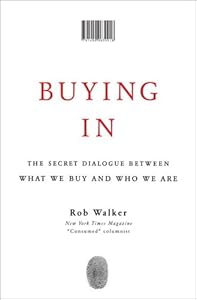- Price
- Convenience
- Quality
- Pleasure
- Ethics (that's the "half factor")
I hate to say it, but while Walker offers a couple of helpful insights, this last section more or less just rolls over and dies. There's probably no such thing as "sustainable consumption," certainly not in a modern city the size of New York City, especially when there are other forces that are more immediate and more tangible and moving in the other direction: struggles against hunger and poverty, the survival of the middle class, immigration, aging of the American workforce, etc. All these things require the expansion of the current economy, and the sustainability narrative isn't a positive, maximizing narrative: it's a negative, minimizing narrative.
Walker edges up to these problems when he notes that, for example, people give themselves a kind of moral or ethical license for wanting to buy greener products, especially if they follow through and spend a little more for a more ethical or cleaner or whatever product: like dieters they tend to allow themselves a counterproductive reward for being good without considering the proportion of the virtue and the reward. So long as this continues to be true, so long as the effects of buying less wasteful or more ethical or whatever products isn't tangible, this will continue to be the case. We're back where we were a couple of books ago with Colin Beavan: Beavan has to believe that giving up real toilet paper helps save imaginary polar bears, so in reality he's left with a spiritual discipline, not an economic or ecological policy. Unfortunately when I hear something like moral panic take hold in someone like Beavan and maybe Walker who think it is really possible to save the world by buying a different brand of t-shirt, or who can't see that Faith Popcorn and Naomi Klein are selling essentially the same product, just with different pitches, I begin to wonder if I'm hearing a story written by Elisabeth Kübler-Ross (stages of grief) or Friedrich von Hayek (the Road to Serfdom).
In the end Walker achieves a minor victory by mostly debunking the occasionally popular notion that the "consumer is in control" of the marketplace; if he'd stuck to that basic idea in the book and organized its various narrative strands around it this would have been a better book: fundamentally the advertisers are professionals and the consumers are amateurs, and everything else in the story is narrative noise.
I know I run the risk of sounding like I hated this book. I didn't; this is just another step in a complicated process of the mass market understanding itself, for lack of a better term. We tend to see ourselves as free agents and the market as a handful of concrete objects plus a bunch of numbers, and we haven't yet answered the question of whether there is a coherent picture that includes all three.

![Reblog this post [with Zemanta]](http://img.zemanta.com/reblog_e.png?x-id=c227eb33-eac2-45d1-b006-712c573e325d)

No comments:
Post a Comment